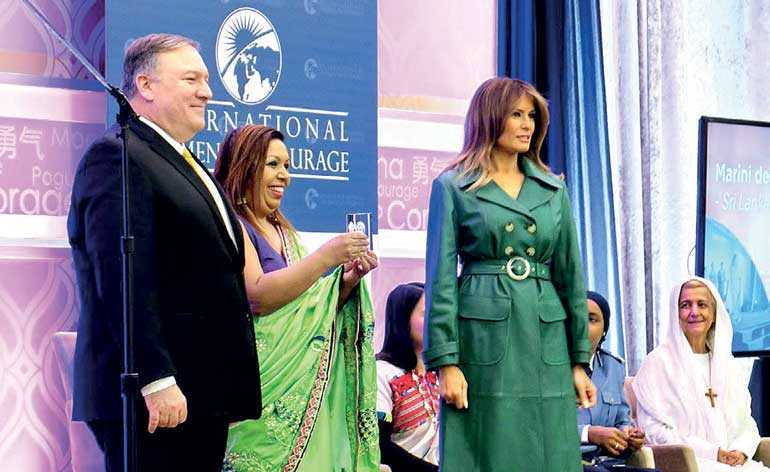Wednesday Feb 18, 2026
Wednesday Feb 18, 2026
Tuesday, 6 October 2020 01:10 - - {{hitsCtrl.values.hits}}

Marini de Livera receives the 2019 International Women of Courage Award from US Secretary of State Mike Pompeo and First Lady Melania Trump
 While CEOs and leaders focus on the future, we’re asking them to pause, reflect on the past, and share the single-most important lesson they have learned.
While CEOs and leaders focus on the future, we’re asking them to pause, reflect on the past, and share the single-most important lesson they have learned.
Our lives and careers are works-in-progress, and we will always learn more in the future than we know now, but what insights could our younger selves – and other aspiring leaders – embrace and act on right now to live a more positive, productive, and empowered life?
Today, Michel Nugawela asks Marini de Livera, Attorney-at-Law, Founder/Chairperson of Sisters-at-Law, what one piece of advice she would give her younger self if she could travel back in time.
Marini de Livera, attorney-at-law, is the recipient of the International Women of Courage Award, established by former US Secretary of State Condaleeza Rice, to pay tribute to 10 women nominated from 150 countries around the world who have shown exceptional courage and leadership in advocating for women’s rights and advancement, often at great personal adversity, danger, and risk. De Livera was nominated by US Ambassador Alaina Teplitz after her brief tenure as chairperson of the National Child Protection Authority.
The advice I would give my younger self and aspiring leaders: be proactive and network with others from a young age so that later you have a likeminded group who work for the underprivileged and speak out against injustice.
I had a huge vision as Chairperson of the NCPA. At times the work I did was extremely dangerous and when I was asked to stop and I didn’t, I was removed. I was very upset but I still had the passion of my convictions, the energy, the drive; all I lacked was a government position, but I told myself I didn’t need one.
|
Marini de Livera
|
That’s when I started Sisters-At-Law, a charity that appears pro bono and provides counselling and a safe space for abused women and girls to think of what they want to do with their future – whether it’s to return to their miserable marriages, or go back to their parents, or leave for the Middle East. In most cases, the victims don’t have lawyers while the other side has a President’s Counsel and is very powerful.
I was penniless when I started Sisters-at-Law, and unfortunately, women lawyers don’t earn as much as men. When I go to the Supreme Court, I’m the only woman seated at the lawyer’s table. The others are juniors who take down notes. There are very few President’s Counsels who are women. The Bar Association is only manned by men. There isn’t a single woman in the executive committee and there has never been a woman president of the Bar Association. As a matter of priority, we need to empower young women lawyers.
Every day has been a challenge and everything is a struggle – finding funds, resources, and trying to make ends meet; meanwhile the Police, the Probation and Women Development Officers from every Divisional Secretariat keep sending me destitute children.
Advice to my younger self: Look around you, see what is wrong and try to correct it; the solution lies within you. We are very good at being armchair critics and placing responsibility at the doorstep of others. But we need to look inward and question our own commitment to resolving society’s problems.
Looking back, I would tell myself to build a network of proactive youth who were interested in working for the public good. When we are young, we have so much energy and passion. We’re busy networking and we always have people around us. We enjoy ourselves at parties and overspend on clothes, which is also what I did. The energy can go in the wrong direction, and so it’s crucial that it’s channelled correctly.
If you take the Eelam war or 1971 insurrection, it’s always the youth who are brought together and brainwashed to take to arms. It’s at that young age that we have a desire to change the world, but it’s also at that age that we are most susceptible to being misguided.
Our education system also focuses only on exams and jobs; even today, school curriculum’s don’t teach children to be socially aware and civic minded. Students should form human rights clubs, be taken to slums, refugee camps, garment factories, and made to interact with Middle East returnees.
I have with me three children of a woman who came back from the Middle East. Her kidney was removed by organ traffickers and she died. Young people need to be aware that such things happen in our country.
Today I’ve begin to gather people and build a network. There are friends helping me and channelling other people to my charity. But if we had had this sense of commitment and duty towards society when we were young, it would all have been much easier.
I think children are the lifeblood of a nation and if they are not guided along the right channels they will grow up to become angry, nasty adults. I have worked in three countries – the UK, Seychelles and Sri Lanka – and in each, I’ve found that people who have had very unhappy and unpleasant childhoods become very nasty when they’re older. As adults, they take revenge from others and cannot work as a team.
If we want to establish a happy, prosperous and productive society, we need to have happy children. We also need happy women, because they are the focal point of the family. If a mother is upset, if she is shattered, then she cannot sustain her children, keep the family together and create a loving home.
Advice to my younger self: We all get so much from society. Even if your parents spend on you, you are privileged because you have benefitted from society. You have to give back to society, to your community. There will always be obstacles but you need to forge ahead and be unstoppable! Never, never give up, for when dreams die, life is a broken winged bird that cannot fly.